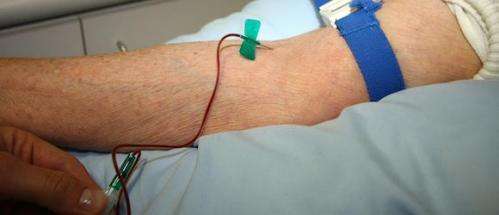Blood test developed to diagnose early onset Alzheimer's disease

A non-invasive blood test that could diagnose early onset Alzheimer's disease (AD) with increased accuracy has been developed by University of Melbourne researchers.
The research team previously identified that changes in the brain occur two decades before patients show signs of dementia. These changes can be detected through expensive brain imaging procedures. The new early detection blood-test could predict these changes and a person's risk of developing AD much earlier than is currently possible.
The blood test has the potential to improve prediction for AD to 91 per cent accuracy. However, this needs to be further tested in a larger population across three to five years, due to AD being a progressive disease.
In an initial trial group using the blood test, one in five healthy participants with no memory complaints tested positive. On further medical investigation using brain-imaging techniques, these patients showed signs of degeneration in the brain resembling AD features.
Lead researcher Professor Andrew Hill from the Department of Biochemistry and Molecular Biology and Bio21 Institute said the blood test would significantly advance efforts to find new treatments for the degenerative disease and could lead to better preventative measures prior to diagnoses.
"This blood test would be crucial to the development of therapeutic and preventative drugs for AD. It can be used to identify patients for clinical drugs and monitoring improvement on treatment," he said.
The high accuracy of this blood test for the brain disorder comes from the ability to harvest protected bubbles of genetic material, called microRNA, found circulating in the bloodstream. Those with AD contain a certain set of microRNA which distinguishes them from healthy people.
Dr Lesley Cheng from the Department of Biochemistry, Molecular and Cell Biology Bio21 Institute believes this test is an accessible method for patients to accurately predict their susceptibility to AD.
"This test provides the possibility of early detection of AD by using a simple blood test which has been designed to also be cost-effective. Furthermore, it is highly accessible for patients and physicians compared to organising a brain scan or undergoing a neuropsychological test.
"Patients with a family history of AD or those with memory concerns could be tested during a standard health check at a medical clinic. This test could ease concerns for patients experiencing normal memory problems due to natural ageing. Those identified as high risk could then be monitored by their doctor," she said.
The research is published in Molecular Psychiatry.


















